Popular on Food52
42 Comments
Winniecooks
September 8, 2022
Rarely, if ever, do hard boiled egg recipes specify whether the timing is for cold eggs or RT eggs. Which are the recipes written for???
Chad R.
April 8, 2015
I found the best peeling eggs are done by steaming. I boil inch of water in pot and put the steaming basket on pot and steam for 18 min. take basket and put straight into cold water after 18 min. Works great every time even with fresh eggs
Gareth
February 22, 2014
This method differs from the time-tested way we have done it for 30 years. As follows: Put eggs in pot cover with cold water. Cover the pot. Set timer to 20 minutes. Heat on high just until water boils then turn off the heat. Leave covered until the timer goes off. Drain off hot water, refill with cold water and add ice cubes. Refrigerate once cold.
Rainbowcottagesinfrance.com
December 30, 2013
I have hens. I never fridge my eggs. For soft or hard boiled, eggs need to be at least two days old. Put eggs into cold or warm water, bring to boil and cook for 4 minutes and 5 seconds for soft boiled with solid white and soft yolk or cook for 7 minutes for hard boiled eggs that do not have seriously solid yolks. To peel, roll around on worksurface to shatter shell before removing shell with a teaspoon inserted upside down under shell.
SBMCW
April 3, 2013
The problem with this method is identified in the text. "an extra minute of cooking time can make a big difference" Why this can be a problem is the time it takes to get the water reach a boil.
An inefficient stove or wrong burner will increase the time the eggs are cooking before reaching a simmer. If you start with boiling water you will always have the same starting water temperature. The time in the boiling water can be exact and when put into the next environment, iced water, the next environment is very defined (This assumes the same number of eggs). This on the face of it would be the better process or at least the better defined and repeatable process across any kitchen environment.
An inefficient stove or wrong burner will increase the time the eggs are cooking before reaching a simmer. If you start with boiling water you will always have the same starting water temperature. The time in the boiling water can be exact and when put into the next environment, iced water, the next environment is very defined (This assumes the same number of eggs). This on the face of it would be the better process or at least the better defined and repeatable process across any kitchen environment.
joy J.
April 3, 2013
I use eggs straight from the refrigerator, put them into boiling salted water, cook 7 and a half minutes to 8 minutes, take out and drain, add cold water, then drain again, add cold water again... then peel and wash off any bits of shell.I use salt because my mother did !!!
James T.
July 2, 2014
Why not just add ice to the mix instead of adding cold water and draining twice?
Beth100
April 3, 2013
Do you start with refrigerator-temperature eggs, or do you let them come to room temp before covering with cold water?
darrell W.
March 23, 2013
The best way to boil an egg, is no to boil it. Perfect every time. http://tiptomato.com/?p=166
joy J.
March 22, 2013
I place my eggs in a pot of boiling salted water for seven and a half minutes (have tried 8 minutes and that is OK too), then drain them and add cold water... do that twice, then shell and wash broken pieces off... been doing that for many years...
Gret
March 22, 2013
Guess I like my eggs a bit more hard boiled, especially when making egg salad. When I want a creamier yoke, I will do it for 7 t0 8 minutes. I also do carefully poke a tiny hole in bottom wide egg base to release the air, so egg doesn't crack & white doesn't leak out, while boiling.
Gret
March 19, 2013
I put eggs in cold water, then bring to a boil. I do lightly boil them for 10 minutes (no longer) & they're perfect. Then into very cold water & peel under running cold water.
Jennifer A.
March 19, 2013
been doing this method for years but it doesn't work on an induction range.
RedPepper
March 19, 2013
I've used the Julia Child method for 40 years. Eggs straight from the fridge into a pot of cold water, bring to a boil, turn off burner and cover pan. Let sit for 15 mins (used to do 17min, but 15 works for me). Drain and fill pot with really cold water. Drain again after 5 mins, fill with cold water again. When I peel them, I crack them on a flat surface and thoroughly crack the shell all over. It always comes off beautifully and the eggs are cooked perfectly. For some reason, the yolks are centered, too...
Fisher114
March 19, 2013
The way to get a perfectly centered yolk is to arrange the eggs in the carton so that they are lying on their sides for 12-24 hours before boiling.
AntoniaJames
March 19, 2013
Lying on their sides in the carton? My egg cartons offer one option: stand them up and down. So, you remove some, and then set the remaining eggs horizontally so they are not actually sitting in the wells? Thanks! ;o)
thirschfeld
March 19, 2013
Fat end up is how eggs should be stored. The air, which develops with age and as the moisture evaporates from the albumin, centers as does the yolk at the fat end.
Bunnee
March 19, 2013
My biggest problem is having yolks that are centered. Frequently, my eggs will have a very thin white section at one end and then a much thicker white section at the other. Makes deviled eggs impossible. Any solutions?
Lusty D.
March 19, 2013
But no mention of the peeling process which is where the trouble begins... A perfectly cooked egg is one of the hardest items to cook. I find that following the "specialized" instruction yields an egg that does not peel... Thus no longer a perfect egg.
vvvanessa
March 19, 2013
My trick for peeling eggs is this: once the hot water is drained off, I shake (not too roughly) the eggs around in the pot to crack the shells (particularly the fat end), then I fill the pot with cold water and let them sit for a few minutes (changing the water out once). I peel them in the pot of water (kind of like the suggestion of peeling them under running water). When I'm patient enough to wait to peel the eggs, it almost always works perfectly.
Slimfender
March 19, 2013
If you prick the fat end of the egg with a push pin before boiling, it makes them extremely easy to peel.
thirschfeld
March 19, 2013
I haven't done this in a long time but I do remember trying it once. I will have to try it too. My guess is the little bit of water, or steam that gets in or gets out might separate the membrane from the shell. Which really is what we are trying to have happen when we peel the egg. If the membrane doesn't separate, well we all know what happens. The ice bath right out of the hot water works well with older eggs which really are the only eggs I like to hard boiling because I am just trying to extend shelf life, but I still run into problems peeling new eggs when I do use them.
CRussell
March 19, 2013
I have chickens, so all of my eggs are always very fresh. I use the pin-prick method on them before I boil them, and it works every time!
richielj
March 19, 2013
Great method I use every weekend to hb eggs for my salads during the week. Works with any number of eggs, too.
thirschfeld
March 19, 2013
I have found it important for each individual to do a three egg test with a variation in time for themselves. It is important because the starting temp of your egg(meaning fridge temp) will make a difference in cooking time as will your altitude. Also the condition of your egg. Older eggs will produce more sulfur but will peel easier. I tried all kinds of methods to produce properly cooked soft boiled to hard boiled in my kitchen and I really do think it is somewhat specific to your conditions. I also salt the water heavily. I do it because egg shells are porous so I figure seasoning the water has to season the egg.
Marian B.
March 19, 2013
Agreed -- cooking eggs is so personal, that I think it's important for everyone to understand an easy technique, and then figure out their preferred time. I like to salt my water, too, but I still have had great results with unsalted water.
thirschfeld
March 19, 2013
Marian I have no idea if salt makes them better or not I just do it because I was always taught to season, season and season again. But you are absolutely right, everyone does need to know how to hard boil an egg.
AntoniaJames
March 19, 2013
Curious title to this . . . the best way to hard cook (or soft cook) an egg is not to boil it at all, as you say in the text. ;o)
Kenzi W.
March 19, 2013
I think it adds! The title draws on that common misconception exactly, as well as grabs those who might associate a hard cooked egg with a hard boiled egg. Even better, then, that we learn how not to boil as we read.
AntoniaJames
March 19, 2013
Hmmm. I find the use of the following text, "[s]uccessfully boiling an egg is quite simple" and "the freshest eggs aren't best for boiling" and "[i]f you're buying from a regular grocer, boil away," troubling for the same reason. We don't actually learn *not* to boil in this post until, after seeing references to boiling three times in the text, we're told not to do so. I stand by my original objection. (But then, I write for a living in an industry where lack of precision can cost my clients millions (and, in the case of one rather well-known client, billions) of dollars, so I could see how others might think I'm overreacting. I have observed, however, that the way terms are used can affect behavior.) ;o)
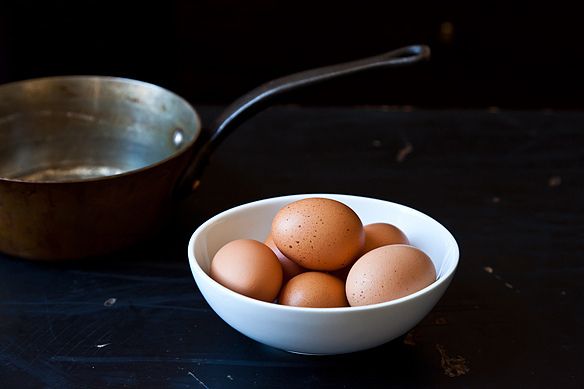
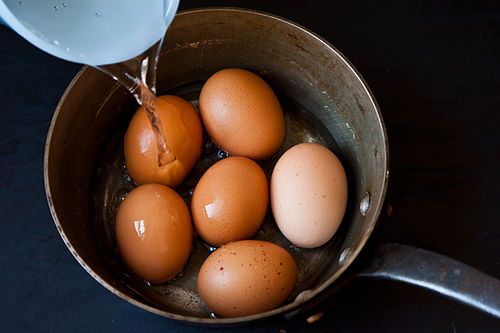
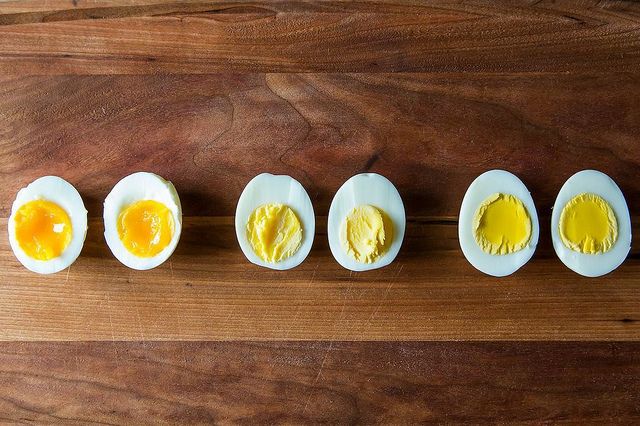
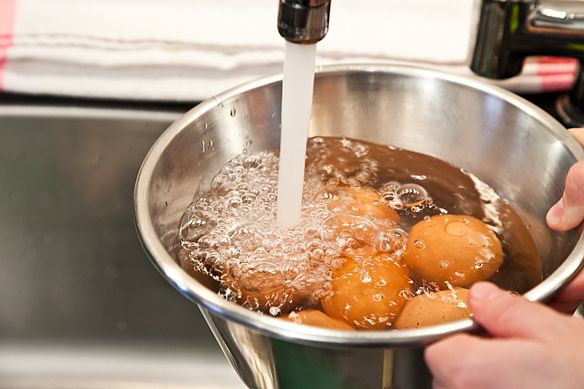
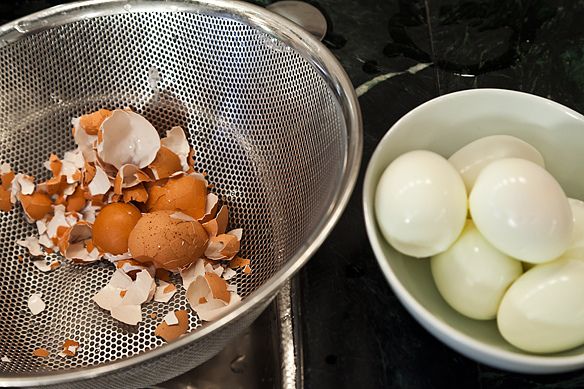
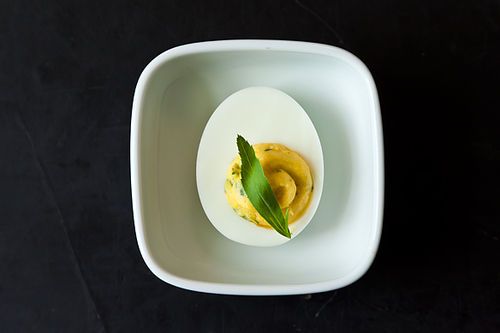

See what other Food52 readers are saying.